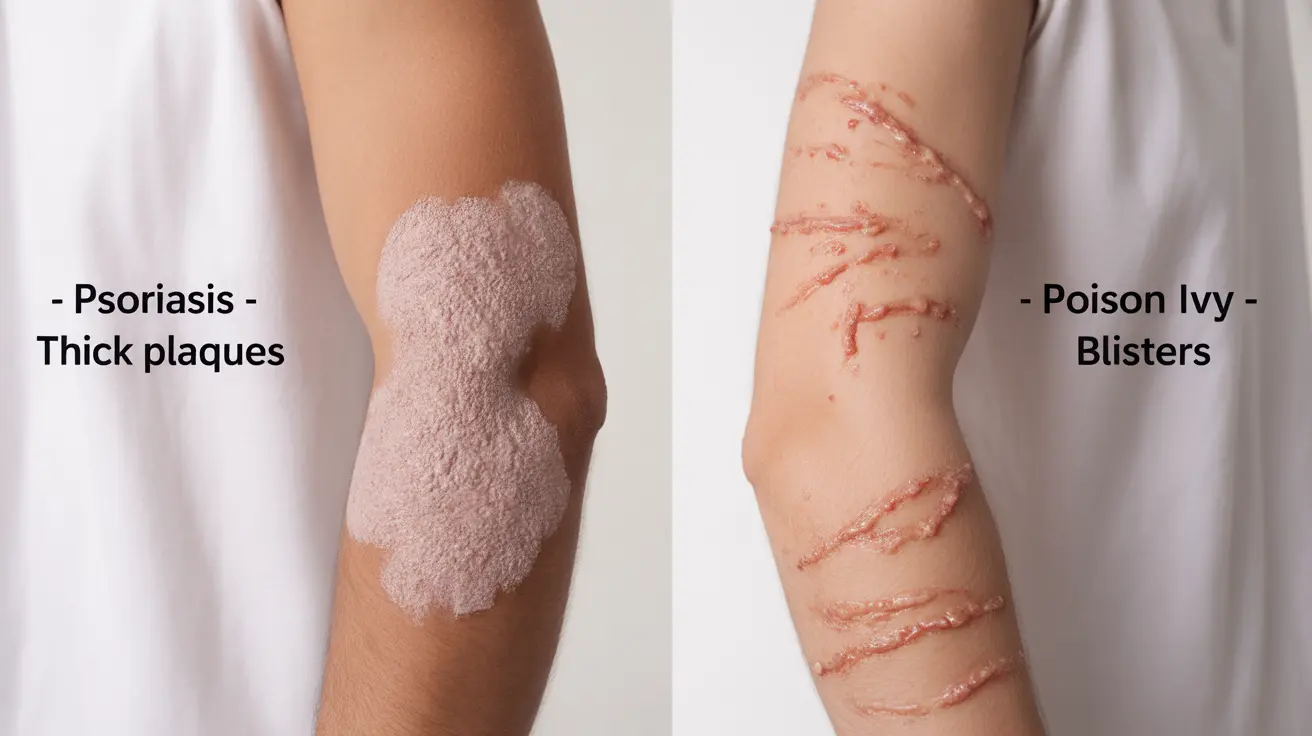When faced with a red, itchy rash, determining whether it's psoriasis or poison ivy can be challenging for many people. While both conditions can cause skin inflammation and discomfort, they have distinct characteristics, causes, and treatment approaches. Understanding these differences is crucial for proper diagnosis and management.
This comprehensive guide will help you distinguish between psoriasis and poison ivy rashes, explore their unique symptoms, and understand the most effective treatments for each condition.
Key Characteristics and Symptoms
Psoriasis Symptoms
Psoriasis is an autoimmune condition that causes specific patterns and symptoms:
- Thick, raised, silvery-white patches (plaques)
- Well-defined borders on affected areas
- Symmetrical distribution on both sides of the body
- Common locations: elbows, knees, scalp, and lower back
- Persistent symptoms that may worsen with triggers
- Can be accompanied by joint pain (psoriatic arthritis)
Poison Ivy Rash Symptoms
Poison ivy causes an allergic reaction with distinct characteristics:
- Linear or streak-like rash pattern
- Intense itching and burning sensation
- Fluid-filled blisters that may ooze
- Rash appears where skin contacted the plant
- Develops within 12-48 hours after exposure
- Can spread if urushiol oil remains on skin or clothing
Understanding the Causes
Psoriasis Origins
Psoriasis develops due to internal factors:
- Genetic predisposition
- Immune system dysfunction
- Triggered by stress, infections, or medications
- Not contagious or caused by external contact
Poison Ivy Reaction
Poison ivy rash results from external exposure:
- Allergic reaction to urushiol oil
- Direct contact with plant leaves, stems, or roots
- Can be transferred through contaminated objects
- Not contagious once skin is washed
Treatment Approaches
Managing Psoriasis
Psoriasis requires long-term management strategies:
- Topical corticosteroids and moisturizers
- Phototherapy (UV light treatment)
- Systemic medications for severe cases
- Lifestyle modifications to prevent flares
- Regular medical monitoring
Treating Poison Ivy
Poison ivy treatment focuses on symptom relief:
- Thorough washing of affected areas
- Over-the-counter antihistamines
- Calamine lotion or hydrocortisone cream
- Cool compresses for comfort
- Oral steroids for severe cases
Duration and Prevention
Psoriasis Timeline
Psoriasis is a chronic condition requiring ongoing management:
- Flares can last weeks to months
- May have periods of remission
- Requires continuous preventive care
- Can be controlled but not cured
Poison Ivy Duration
Poison ivy follows a predictable healing pattern:
- Symptoms typically last 1-3 weeks
- Rash resolves completely with proper care
- No long-term effects once healed
- Prevention through plant identification and avoidance
Frequently Asked Questions
What are the main differences in symptoms between psoriasis and poison ivy rash?
Psoriasis typically presents with thick, silvery-white scales and well-defined plaques, while poison ivy causes linear rashes with fluid-filled blisters. Psoriasis is symmetrical and chronic, while poison ivy appears where contact occurred and resolves within weeks.
How can I tell if a red, itchy rash is caused by psoriasis or poison ivy exposure?
Consider the pattern and timing of the rash. Poison ivy appears 12-48 hours after plant exposure in a linear pattern, while psoriasis develops as thick, scaly patches unrelated to environmental contact. Poison ivy also tends to blister, unlike psoriasis.
What treatments are effective for managing psoriasis compared to poison ivy rash?
Psoriasis requires long-term management with topical treatments, phototherapy, or systemic medications. Poison ivy treatment focuses on short-term relief through washing, antihistamines, and topical treatments until the rash naturally resolves.
How long does a poison ivy rash last versus a psoriasis flare-up?
Poison ivy rashes typically resolve within 1-3 weeks with proper treatment. Psoriasis flare-ups can last several weeks to months and may recur throughout life, requiring ongoing management.
What steps can I take to prevent poison ivy rash and manage psoriasis flare-ups?
Prevent poison ivy by learning to identify and avoid the plant, wearing protective clothing, and washing immediately after potential exposure. Manage psoriasis by identifying triggers, maintaining a healthy lifestyle, following prescribed treatments, and managing stress levels.




